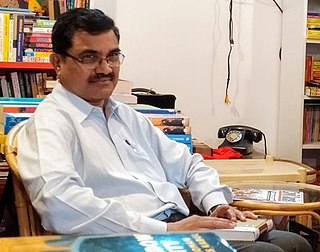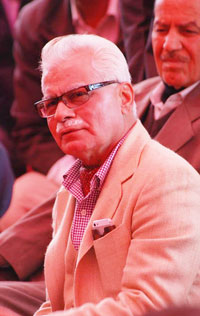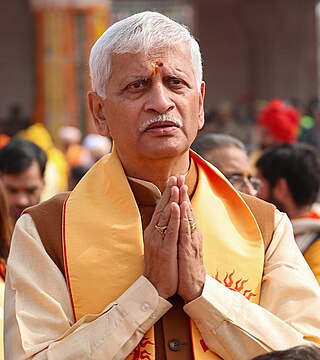
Om Prakash Chautala is an Indian politician who has served as the 7th Chief Minister of Haryana from Indian National Lok Dal. He is the son of 6th Deputy Prime Minister of India, Chaudhary Devi Lal.

Subramanian Swamy is an Indian politician, economist and conspiracy theorist. Before joining politics, he was a professor of Mathematical Economics at the Indian Institute of Technology, Delhi. He is known for his Hindu nationalist views. Swamy was a member of the Planning Commission of India and was a Cabinet Minister in the Chandra Shekhar government. Between 1994 and 1996, Swamy was Chairman of the Commission on Labour Standards and International Trade under former Prime Minister P. V. Narasimha Rao. Swamy was a long-time member of the Janata Party, serving as its president until 2013 when he joined the Bharatiya Janata Party (BJP). He has written on foreign affairs of India dealing largely with China, Pakistan and Israel. He was nominated to Rajya Sabha on 26 April 2016 for a six-year term, ending on 24 April 2022.

Indira Jaising is an Indian lawyer and activist. Jaising also runs Lawyers' Collective, a non-governmental organization (NGO), the license of which was permanently cancelled by the Home Ministry for alleged violations of the Foreign Contribution Regulation Act in 2019. The Bombay High Court later passed an order to de-freeze NGO's domestic accounts. The case is ongoing in the Supreme Court of India.
Siddharth Vashisht, better known as Manu Sharma, is a murderer of Indian origin, convicted in 2006 to serve life imprisonment for the 1999 murder of Jessica Lal. He was released in June 2020. Sharma is the son of the former Indian National Congress leader, Venod Sharma, and the brother of media baron, Kartikeya Sharma.

Binayak Sen is a paediatrician, and public health specialist. He is the national Vice-President of the People's Union for Civil Liberties (PUCL). He is the recipient of several awards including the Jonathan Mann Award, the Gwangju Prize for Human Rights, and the Gandhi International Peace Award. He has been convicted of sedition by a local Court in India which was later upheld by the High Court of Chhattisgarh. He was subsequently granted bail by the Supreme Court of India on appeal. He is a member of the policy group for Police Reforms of Aam Aadmi Party.

The Unlawful Activities (Prevention) Act is an Indian law aimed at prevention of unlawful activities associations in India. Its main objective was to make powers available for dealing with activities directed against the integrity and sovereignty of India. The most recent amendment of the law, the Unlawful Activities (Prevention) Amendment Act, 2019 has made it possible for the Union Government to designate individuals as terrorists without following any formal judicial process. UAPA is also known as the "Anti-terror law".

Anand Teltumbde is an Indian scholar, writer, and civil rights activist who is a management professor at the Goa Institute of Management. He has written extensively about the caste system in India and has advocated for the rights of Dalits. He is also a longtime critic of Prime Minister Narendra Modi, and was imprisoned in 2020 along with other activists and intellectuals who were critical of the government. He was arrested in 2018 Bhima Koregaon violence case after his anticipatory bail was rejected firstly by Bombay High Court followed by the Supreme Court of India. Both the courts said that there is prima facie evidence against him. His arrest has been condemned by other academics and human rights organizations, and legal experts have said that the charges against him appear to be fabricated.

Ram Kumar Anand is a lawyer and former Member of Parliament, Rajya Sabha, serving during the NDA government. He is Senior Vice-President of Indian Olympic Association from 14 December 2017. He also served as the chairman of the Bar Council of Delhi for two terms and was a member of the Bar Council of Delhi for 25 years. He held the position of Vice-President of the Indian Law Institute for over 25 years.

Uday Umesh Lalit is an Indian lawyer and former Supreme Court Judge, who served as the 49th Chief Justice of India. Previously, he has served as a judge of Supreme Court of India. Prior to his elevation as a judge, he practised as a senior counsel at the Supreme Court. Justice Lalit is one of the six senior counsels who have been directly elevated to the Supreme Court. He is currently ‘Distinguished Visiting Professor’ at Ashank Desai Centre for Policy Studies, Indian Institute of Technology, Bombay. and Distinguished Visiting Professor at West Bengal National University of Juridical Sciences
Qasim Faktoo is a Kashmiri separatist and militant, serving life imprisonment for the murder of Hriday Nath Wanchoo. He had been among the earliest cadres of Hizbul Mujahideen.
Justice Gita Mittal is a retired Indian judge. She is the former Chief Justice of the Jammu and Kashmir High Court and the first woman judge to serve in that capacity. She has also served as the Acting Chief Justice of Delhi High Court while she was serving as a Judge of the Delhi High Court.

Umar Khalid is an Indian student activist, a former research scholar at Jawaharlal Nehru University, former leader of Democratic Students' Union (DSU) in JNU. He was allegedly involved in the Jawaharlal Nehru University sedition row and is an accused under the UAPA law. Khalid is also associated with United Against Hate, a campaign founded along with Nadeem Khan in July 2017 in response to the series of lynchings.
Surendra Gadling is a human rights lawyer and Dalit rights activist based in Nagpur.
Rona Wilson is an activist, researcher and the public relations secretary of the Committee for Release of Political Prisoners (CRPP). He has worked with people accused in terrorism cases, including those booked under the Unlawful Activities (Prevention) Act (UAPA). He is an accused in the 2018 Bhima Koregaon violence.
In India, the offence of contempt of court is committed when a person either disobeys a court order, or when a person says or does anything that scandalizes, prejudices, or interferes with judicial proceedings and the administration of justice. Contempt of court can be punished with imprisonment or a fine, or both.

Stanislaus Lourduswamy, SJ, popularly known as Stan Swamy, was an Indian Catholic priest, a member of the Jesuit order, and a tribal rights activist for several decades. Swamy was the oldest person to be accused of terrorism in India.
Pushpa Virendra Ganediwala is an Indian lawyer. She was previously an additional judge of the Bombay High Court, but resigned in 2022, after the Supreme Court of India took the unusual step of refusing to confirm her appointment to the High Court as permanent, after she delivered several controversial judgments concerning cases of sexual assaults against women and children.
Vernon Gonsalves is a trade unionist, activist and academician, and an accused in the 2018 Bhima Koregaon violence. His wife, lawyer Susan Abraham, is also a workers rights activist. Vernon was arrested under the Unlawful Activities (Prevention) Act.
Suvra Ghosh is an Indian judge, currently sitting on the Calcutta High Court in West Bengal. She has adjudicated in a number of significant cases, including those concerning the imposition of the death penalty in India, and notably imposed a fine on the Calcutta High Court itself after ruling that the Court had previously erred in ordering a magistrate to retire following alleged misconduct.
Ishrat Jahan is an Indian practising advocate and former municipal councillor for the Indian National Congress in Delhi who is an accused under the Unlawful Activities (Prevention) Act and was granted bail on 14 March 2022 after her incarceration since February 2020.










